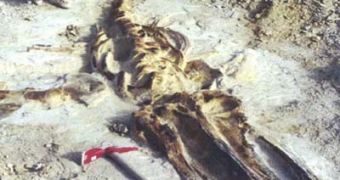Italian archaeologists have dug the fossil skeleton of a 4 million-year-old whale in the Tuscan countryside, a found that comes to shed a light on reconstructing the image of the prehistoric sea that once covered the peninsula.
The 33-foot (10-meter) fossil, dated to the Pliocene epoch, was discovered in almost perfect order, with only the jaw bones displaced, explained paleontologists with the Museum of Natural History in Florence.
As almost all the Italian peninsula was once a sea bed, it is not so uncommon to discover cetacean fossils in Tuscany.
But the whale skeleton, located about 6 miles (10 km) east of the Mediterranean, is outstanding as it is almost complete, and a lot of organisms were discovered around it.
"The finding is spectacular," said Elisabetta Cioppi, the head of the museum's paleontology department and coordinator of the excavation.
"The variety of the sea organisms associated with the whale - shells, fish and others - is extraordinary. It enables us to make a thorough reconstruction of the environment. Researchers are cataloging the organisms for lab research," she said.
Researchers believe that fish and other sea organisms could have lived off the whale's decomposing carcasses.
Amongst the whale bones were discovered some shark teeth, that's why the scientists believe that the whale could have been attacked just before it died, but further analysis will elucidate this.
Diggings for the whale skeleton started in February after an amateur researcher stumbled upon the bones while looking for fossils last year.
"The skeleton was found about 100 yards (meters) underground in Orciano Pisano, about 50 miles (80 kilometers) west of Florence," the museum said.
"The warm waters that covered the Tuscan countryside started receding about 1.5 million years ago," said Alessandro Garassino, a professor with Milan's Museum of Natural History.
The Tuscan countryside has delivered bones and fragments for centuries, including other whale skeletons, like the one found under a Tuscan vineyard only weeks ago.
"This is not an unusual" discovery. But it does confirm that the Mediterranean is favorable to the development of these sea mammals." said Garassino.

 14 DAY TRIAL //
14 DAY TRIAL //